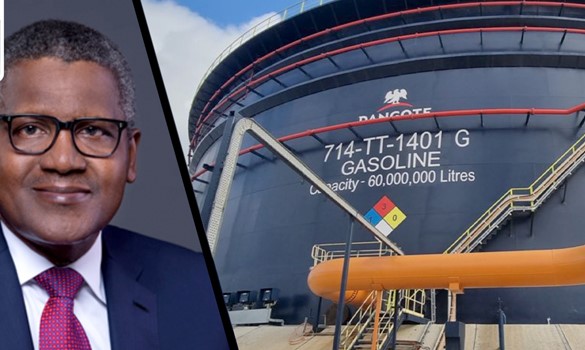Aliko Dangote, Africa’s richest person, says the Nigerian National Petroleum Company (NNPC) Limited no longer owns 20 percent stake in Dangote Petroleum Refinery.
Speaking during a press briefing at the refinery on Sunday, Dangote said NNPC now owns 7.2 percent of the refinery over failure to pay the balance of their share, which was due in June.
“NNPC no longer owns 20 percent stake in the Dangote refinery. They were met to pay their balance in June, but have yet to fulfil the obligations. Now, they only own a 7.2% stake in the refinery,” Dangote said.
In September 2021, NNPC acquired a 20 percent interest in Dangote refinery for $2.76 billion.
NNPC said the balance ($1.76 billion) of the cost of equity investments made in Dangote refinery would be paid upon completion of the refinery project or any other date agreed.
Dangote refinery commenced production on January 12.
Dangote who said this while briefing journalists in Lagos on Sunday, said, “NNPC no longer owns a 20% stake in the Dangote refinery. They were meant to pay their balance in June but have yet to fulfill the obligations. Now, they only own a 7.2% stake in the refinery.”
Speaking to journalists at a one-day training programme organised by the Dangote Group on Friday, the Vice President of Oil and Gas at Dangote Industries Limited, Devakumar Edwin accused International Oil Companies in Nigeria of plans to frustrate the survival of the new Dangote Oil Refinery and Petrochemicals.
Edwin also accused the Nigerian Midstream and Downstream Petroleum Regulatory Authority of granting licences indiscriminately to marketers to import dirty refined products into the country.
He noted that though the Nigerian Upstream Petroleum Regulatory Commission was trying its best to allocate crude oil for the 650,000-capacity refinery, “the IOCs are deliberately and willfully frustrating our efforts to buy the local crude.”
This, he said, was done by hiking the cost above the market price, thereby forcing the refinery to import crude from countries as far as the United States, with its attendant high costs.
More so, the Federal Government and crude oil producers in Nigeria have shown commitment to working towards a sustainable supply of crude oil to local refineries under a market-determined pricing system.
Both parties said the commitment aimed to ensure that while the operators (crude oil producers) do business optimally, the refineries are not starved of feedstock.
Accordingly, the industry regulator, the Nigeria Upstream Petroleum Regulatory Commission has directed oil refiners in the country to provide monthly price quotes on crude supply.
As contained in a Bloomberg report on Friday, the refinery is set to import a cargo of Brazilian crude, Bloomberg reported on Friday.
It said this would add to the large number of overseas barrels of crude feedstock that the Nigerian firm was importing.






